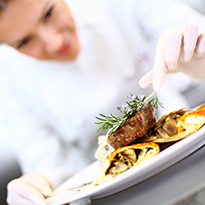The Importance of Food Safety
Wednesday, 17 May 2017

Christmas, Easter, Valentine’s Day, and Mother’s day are all on the longwinded list of holidays that give the hospitality industry opportunities to entice potential customers. Since customers don’t see what goes on behind closed doors during the stages of getting their food to their tables, you’ve got to prove to them that you know exactly how to prepare their food, with one thing: food safety procedures.
Food safety is the way in which food handlers or supervisors prepare, handle and store food to prevent illness. A food safety training course is a legal requirement for this demographic - the minimum level of training required would be covered by a Level 2 food safety course. A Food Standards Agency study found that there are more than 500,000 cases of food poisoning each year caused by known pathogens – this could be suppressed by implementing food safety procedures.
The importance of food safety is often gone unrecognised and underestimated, as we tend to focus mainly on the taste and presentation of our meals. Food safety is an important part of the process, and most of us will experience food poisoning at least once in our lives.
According to World Health Organization, 1 in 10 people fall ill every year from consuming contaminated food, resulting in 420,000 people dying each year. Being the venue that gives their customers food poisoning is far from the image you want, and the last thing you need is to get in trouble for something that can be easily avoided.
Cases such as the 2008-2009 salmonella epidemic show the importance of food safety procedures. The outbreak was traced back to cross-contamination of peanut products, and led to the former peanut plant executive being sentenced to 28 years in prison. The famous quote: ‘prevention is better than cure,’ comes into practice - as the possible results of poor food handling aren’t worth the carelessness.
Here at CPL Training, we deliver courses that enhance knowledge of food safety and educate learners on ways to avoid the possible outcomes that may occur due to poor food handling. If you need any assistance with food safety, contact us today to see how we can help.